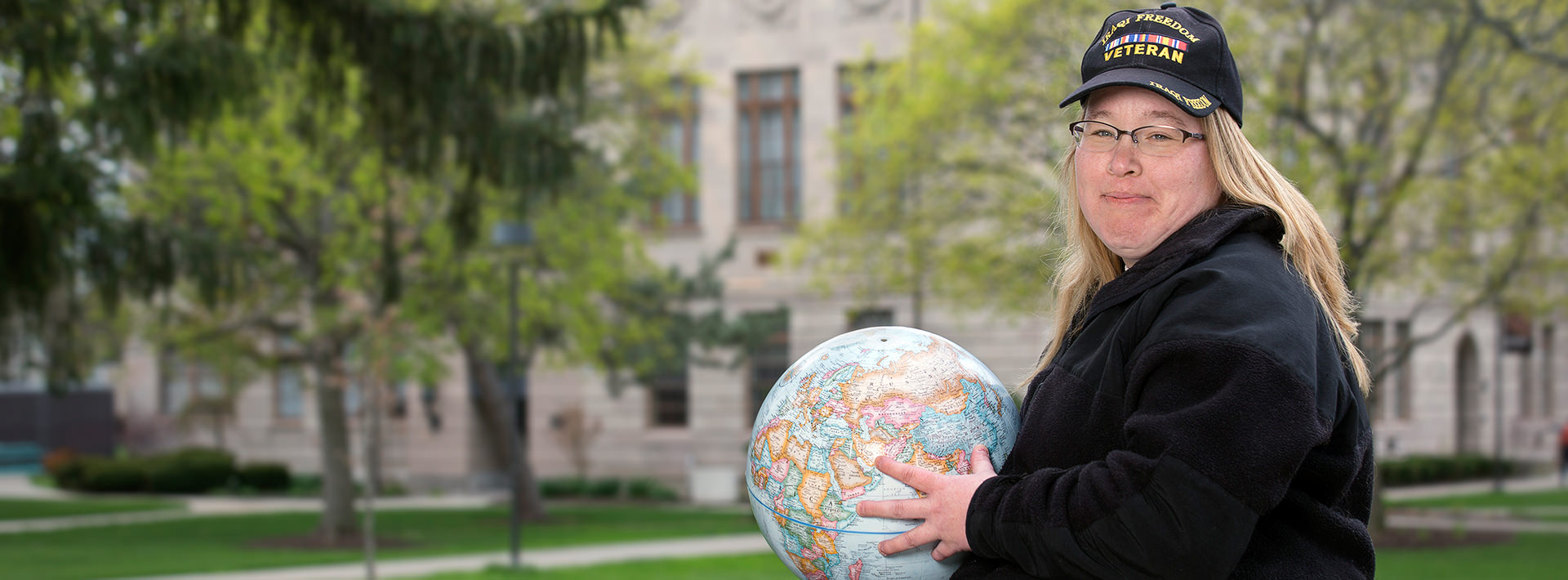Class of 2015 Success Stories: True Grit
Army vet overcomes obstacles to earn degree in 3 majors

By Julie Carle
When Tanya Schardt accepted her diploma from Bowling Green State University on May 9, she defied many odds.
The Army veteran from Fremont, Ohio, who was critically injured in 2008 while deployed in Iraq, wasn’t expected to live, let alone graduate from college.
During her third deployment, she suffered a traumatic brain injury (TBI) when a Humvee in which she was riding took a hit from an improvised explosive device (IED). In that brief tragic moment, her entire life changed. Two of her colleagues were killed, two had minor injuries and she was left with life-altering injuries. In addition to the TBI, one of her knees was severely injured and her back was brutally battered from the impact.
“I’m here for a reason. I intend to let people know there are no limitations that can stop them.”
She doesn’t recall anything about the incident. In fact she doesn’t remember anything until she woke days later in a combat surgical hospital. She successfully fought for her life, but her neurologist told her she would never be able to finish school. Not only did she graduate, but also she earned a degree in three majors— German, geography and history.
Studying three different majors in the College of Arts and Sciences is indicative of the determination and grit Schardt exemplifies in all areas of her life, as a soldier, a student and a person.
“I went into the military because I wanted something challenging. I didn’t want the traditional path for women in the military,” Schardt said.
“Instead I went into armament, working on anything that fires,” she explained. “It was the closest thing to combat. It was very aggressive, heavy work, and I stuck with it.”
Once she returned home after multiple surgeries and months of hospitalizations, she became depressed. After hearing the prognosis from her doctor that she would not be capable of earning a college degree, Schardt was “sitting at home feeling like I could no longer contribute to society,” she recalled.
Her mother, concerned about the terrifying statistics of wounded veterans who commit suicide, suggested Schardt consider attending BGSU. “What do you have to lose?” her mother questioned.
Though Schardt’s short-term memory wasn’t good, her long-term memory seemed to hold the key to her success in college. She had spent time in Germany, and amazingly had the ability to remember German.
She met with German faculty member Dr. Edgar Landgraf, who assured her she could accomplish the task with the right support and commitment. Without his encouragement, “I would have never taken the step to enroll.”
Other faculty members were equally supportive and patient with her requests for assistance. In fact, enthusiastic and dedicated faculty contributed to her decision to take on triple majors. Dr. Beth Griech-Polelle and Dr. Walter Grunden convinced her to add history to her major, and after enjoying so many geography courses, she decided to add that as yet another major.
Because of her short-term memory issues, studying for her courses was difficult, at best, Schardt said. Her trick was to take audio and video recordings of some of her professors, with their permission. She also established an elaborate system of note cards and notes. “I have to spend a lot more time studying than most people, but I also have such good notes that often other students in my classes would ask to see my notes,” she said.
She constantly had to work at remembering facts, figures and statistics. Notecards were everywhere in her house and notebooks. She also used the drive time between Fremont and Bowling Green to listen to lectures, attempting to store the information in her long-term memory banks. “I found ways to do the work and that’s how I’ve made it.”
Though she was a nontraditional student, Schardt discovered the benefits of getting involved. She was a member of Phi Sigma Pi honorary fraternity, German Club and Geography Club. She was asked to speak to some classes on campus, recently to a film class of Dr. Brett Holden, theatre and film, where she told her story and the story of her fallen brothers.
“Dr. Holden explained that this is my purpose, to talk about women in combat, and their contributions, and to make sure my brothers’ stories aren’t lost,” Schardt said.
Her most recent and prized accomplishment was to be inducted during her last semester on campus into Phi Alpha Theta, the “Excellence in History” honorary society.
“That was one of the goals I had for myself,” Schardt said with a smile. “It required a certain grade point average, but more importantly it required that I be in the top 15 percent of my class.”
Now, with that honor and a diploma in hand, she will continue her outreach to help others dealing with a similar plight and prove success is within everyone, with a little bit of grit and determination. It’s a lesson she hopes to convey to her neurologist, who initially gave her no reason to hope.
“I’m here for a reason,” she said. “I intend to let people know there are no limitations that can stop them.”
Updated: 12/02/2017 12:46AM
